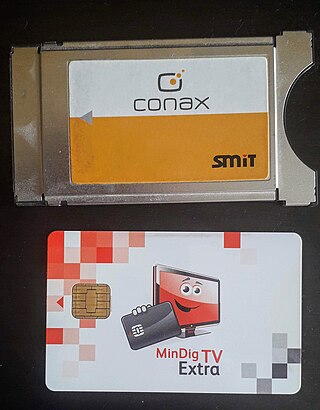Canal+, also spelt Canal Plus and sometimes abbreviated C+ or Canal, is a French premium television channel owned by the Groupe Canal+. The channel was launched in November 1984, and broadcasts to Metropolitan France. It broadcasts several kinds of programming, mostly encrypted, but some unencrypted content can be viewed free of charge.
Pirate decryption is the decryption, or decoding, of pay TV or pay radio signals without permission from the original broadcaster. The term "pirate" is used in the sense of copyright infringement. The MPAA and other groups which lobby in favour of intellectual property regulations have labelled such decryption as "signal theft" even though there is no direct tangible loss on the part of the original broadcaster, arguing that losing out on a potential chance to profit from a consumer's subscription fees counts as a loss of actual profit.

Vivo, known as Vivo Brazil, is a brand of Telefônica Brasil, a subsidiary of Telefónica and the largest telecommunications company in Brazil. It is headquartered in the Brooklin Novo neighborhood of São Paulo.

Conax develops television encryption, conditional access and content security for digital television. Conax provide CAS technology to pay TV operators in 85 countries. The company has offices in Norway (headquarters), Russia, Germany, Brazil, the United States, Canada, Mexico, Indonesia, Philippines, Thailand, China, Singapore, and India, with a 24/7 Global Support Center in India.

A conditional access module (CAM) is an electronic device, usually incorporating a slot for a smart card, which equips an integrated digital television or set-top box with the appropriate hardware facility to view conditional access content that has been encrypted using a conditional access system. They are normally used with direct-broadcast satellite (DBS) services, although digital terrestrial pay TV suppliers also use CAMs. PC Card form factor is used as the Common Interface form of Conditional Access Modules for DVB broadcasts. Major CAM manufacturers are Airmod.tech and SMIT. Airmod, created in 2022, regroup CAM formerly managed by Neotion and SmarDTV.

VideoCipher is a brand name of analog scrambling and de-scrambling equipment for cable and satellite television invented primarily to enforce Television receive-only (TVRO) satellite equipment to only receive TV programming on a subscription basis.
Television encryption, often referred to as scrambling, is encryption used to control access to pay television services, usually cable, satellite, or Internet Protocol television (IPTV) services.
Conditional access (CA) is a term commonly used in relation to software and to digital television systems. Conditional access is an evaluation to ensure the person who is seeking access to content is authorized to access the content. Access is managed by requiring certain criteria to be met before granting access to the content.

In television encryption, Cryptoworks is a DVB conditional access system, developed by Philips CryptoTec but now belonging to Irdeto.
Multi-Choice TV (MCTV) is a television service provider in Barbados. It is a Multichannel Multipoint Distribution Service (MMDS) or DVB-C wireless microwave-based broadcast subscription television provider. They offer a variety of packages which can be considered as comparatively priced to similar providers throughout the world.
Nagra France is a company which develops and markets the Mediaguard conditional access system for digital television. It is a subsidiary of the Kudelski Group.

B-MAC is a form of analog video encoding, specifically a type of Multiplexed Analogue Components (MAC) encoding. MAC encoding was designed in the mid 80s for use with Direct Broadcast Satellite systems. Other analog video encoding systems include NTSC, PAL and SECAM. Unlike the FDM method used in those, MAC encoding uses a TDM method. B-MAC was a proprietary MAC encoding used by Scientific-Atlanta for encrypting broadcast video services; the full name was "Multiple Analogue Component, Type B".

Satellite television is a service that delivers television programming to viewers by relaying it from a communications satellite orbiting the Earth directly to the viewer's location. The signals are received via an outdoor parabolic antenna commonly referred to as a satellite dish and a low-noise block downconverter.

A free-to-air or FTA Receiver is a satellite television receiver designed to receive unencrypted broadcasts. Modern decoders are typically compliant with the MPEG-4/DVB-S2 standard and formerly the MPEG-2/DVB-S standard, while older FTA receivers relied on analog satellite transmissions which have declined rapidly in recent years.

Kudelski SA is a Swiss company that sells digital television access and management systems, content protection solutions, cybersecurity solutions, Internet of Things products and public access infrastructure. The company is headquartered in Cheseaux-sur-Lausanne and Phoenix, Arizona. Kudelski's first successful product was the Nagra tape recorder, developed by founder and Polish-born researcher Stefan Kudelski.
The Netherlands now has three major forms of broadcast digital television. Terrestrial (DVB-T), Cable (DVB-C), and Satellite (DVB-S). In addition IPTV services are available. At the end of the first quarter of 2013 almost 84% of the households in the Netherlands had some form of digital television.

Dream Satellite TV was the first all-digital Direct-To-Home (DTH) television broadcasting service via satellite in the Philippines. Broadcasting from the Dream Broadcast Center located at the Clark Special Economic Zone in Pampanga. Content is received from program providers, compressed and broadcast via Koreasat 5 in DVB-S and NTSC color format exclusively to its subscribers using the Integrated Receiver-Decoder and the Conax/Nagravision 3 Encryption System.
Claro TV+ is a Latin American operator of pay television. The service is supplied by Embratel and Claro companies and operates in Star One C4 satellite. Its transmission system is DTH in Ku Band, and the channels are encrypted by Nagravision 3 system. The reception is made via mini-satellite dish and a DVB-S2 receiver, and subscribers authentication is made by conditional access card.
Satellite television varies in the different regions around the world.
Canal+ was a Spanish satellite broadcasting platform. It was previously known as Digital+ since its launch in 2003, and from 2011 it was known as Canal+, being named after its main premium channel.











